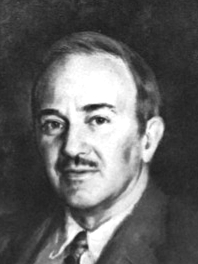The Theory of Monopolistic Competition
| Edward H. Chamberlin | |
|---|---|
 |
|
| Born |
May 18, 1899 La Conner, Washington |
| Died | July 16, 1967 (aged 68) Cambridge, Massachusetts. |
| Nationality | American |
| Institution | Harvard University |
| Field | Microeconomics |
| School or tradition |
Neoclassical economics |
| Alma mater |
University of Iowa University of Michigan Harvard University |
| Doctoral advisor |
Allyn Abbott Young |
| Contributions | Monopolistic competition |
Edward Hastings Chamberlin (May 18, 1899 – July 16, 1967) was an American economist. He was born in La Conner, Washington, and died in Cambridge, Massachusetts.
Chamberlin studied first at the University of Iowa (where he was influenced by Frank H. Knight), then pursued graduate-level studies at the University of Michigan, eventually receiving his Ph.D. from Harvard University in 1927.
For most of his career Edward Chamberlin taught economics at Harvard (1937–1967). He made significant contributions to microeconomics, particularly on competition theory and consumer choice, and their connection to prices. Edward Chamberlin coined the term "product differentiation" to describe how a supplier may be able to charge a greater amount for a product than perfect competition would allow. In 1962 was admitted as corresponding academician to the RACEF.
His most significant contribution was the Chamberlinian monopolistic competition theory. Chamberlin published his book The Theory of Monopolistic Competition in 1933, the same year that Joan Robinson published her book on the same topic: The Economics of Imperfect Competition, so these two economists can be regarded as the parents of the modern study of imperfect competition. Chamberlain's book is often compared to Robinson's book The Economics of Imperfect Competition, in which Robinson coined the term "monopsony," which is used to describe the buyer converse of a seller monopoly. Monopsony is commonly applied to buyers of labour, where the employer has wage setting power that allows it to exercise Pigouvian exploitation and pay workers less than their marginal productivity. Robinson used monopsony to describe the wage gap between women and men workers of equal productivity.
...
Wikipedia
